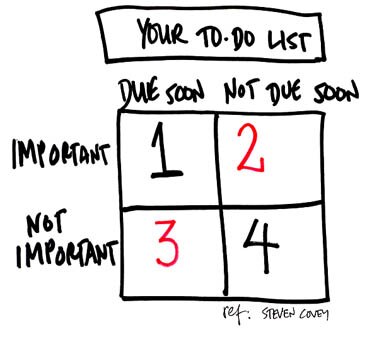
Time Management is a habit – it’s not something you can learn easily. Being organized doesn’t automatically mean you will succeed at time management.
This graphic details a time management tip from Steven R Covey’s book “7 Habits of Highly-Effective People.” It illustrates four possible categories for the things on your to-do list:
- important and due soon (1)
- important and not due soon (2)
- not important but due soon (3)
- not important and not due soon (4)
People make a mistake when they focus more on 2 and not 3. Ranking your projects in order of deadlines, than importance, is a good practice.
Routines and practice is something that goes hand and hand with those that are best at managing their time. It’s also about “determining” a few other things that play into the graph above.
Determine your personality
Most are separated into ‘Type A’ or ‘Type B’ personalities. Much is dependent on the environment and type of professional field. A Type A will get a lot done at a fast pace, and set a lot of goals, while Type B will take their time and focus on one project at a time. Each has pros and cons. Recognizing what type will help you juggle projects and know how to approach each.
Determine if its paper or digital
Determine a system that works best for the individual. If reminders help, utilize an Outlook calendar and smart phone alerts. If you’re a compulsive checker, have the schedule on both paper agenda and an online platform. If paper is easily lost in your handbag (can I hear an amen?) then invest in a dry erase board.
Evaluate yourself during the day to see if you are on track, and re-focus as needed.
Determine strategy behind measurable objectives
Anyone can make a list and say that they will do this or that during the day. Juggling takes practice.
Create “objectives of the week” and don’t state why you are going to do them – but HOW. Jot down a few bullet points, as well as benchmarks to achieve throughout the week. Write down how much time it will take until you get in the groove. Reward yourself with “me” time at the end of the day – or the morning.
Time management is about the individual and what will work for them. Evaluation is key. What else would you add? Are there other indicators?




